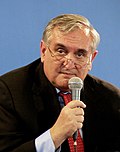Union for a Popular Movement
The Union for a Popular Movement (French: Union pour un Mouvement Populaire, UMP), was the main French centre-right political party. It was formed in 2002. On 30 May 2015, it was replaced by The Republicans.
The party had an absolute majority in the National Assembly but lost its majority in the Senate in September 2011. The UMP is a member of the European People's Party (EPP), of the Christian Democrat International (CDI) and of the International Democrat Union (IDU).
History
Since the 1980s, the political groups of the parliamentary right joined forces around the values of economic liberalism and the building of Europe. Their rivalries had contributed to their 1981 and 1988 electoral defeats. Therefore, some politicians were in favour of the formation of a confederation, a party.
UMP was founded from the merger of the Gaullist-conservative Rally for the Republic (Rassemblement pour la République, RPR), the conservative-liberal Liberal Democracy (Démocratie Libérale, DL), and a part of the centrist Union for French Democracy (Union pour la Démocratie Française, UDF). Many Christian Democrats (such as Philippe Douste-Blazy and Jacques Barrot), the social-liberal Radical Party and the centrist Popular Party for French Democracy (both associate parties to UDF until 2002) joined the party.
The party was thus born out of the meeting of four major French political traditions: Gaullism, Liberalism (Republicanism), Christian Democracy (Popularism) and Radicalism.
The UMP generally supported the policies of President Jacques Chirac. However, in 2004, the party showed increasing signs of independence. The unpopularity with the electorate of Jacques Chirac and Jean-Pierre Raffarin's government led most members of the UMP to support Nicolas Sarkozy, a rival of Chirac. The party also publicly disapproved of Turkey's proposed membership in the European Union, which Chirac was in favour of.
The first president of the UMP, Alain Juppé, a close associate of Jacques Chirac, resigned on 15 July 2004. On 29 November 2004, Nicolas Sarkozy announced that he would officially take over the presidency of the UMP.
In the 2004 French regional elections the UMP suffered a heavy blow, securing only 2 out of 22 regions in Metropolitan France and half of the departments. This led to the fall of the Jean-Pierre Raffarin government (2001-04), and to the formation of a new cabinet, presided by another UMP politician, Dominique de Villepin.
On 22 April 2007 Nicolas Sarkozy won most of the votes in the first round of the 2007 presidential election. In the second round, he faced Socialist Candidate Ségolène Royal. On 6 May 2007 he won the Presidential election, garnering 53.35% of the vote.
Factions
Sarkozystes
- Liberal Conservatives (conservatives, liberal-conservatives and conservative-liberals): Nicolas Sarkozy, Jean-Claude Gaudin, Jean-Pierre Raffarin, Valéry Giscard d'Estaing, Édouard Balladur, Dominique Bussereau, François Fillon, Michel Barnier, Dominique Perben, Jean-François Mattei, Renaud Donnedieu de Vabres, Charles Millon, Alain Lamassoure, Brice Hortefeux, François Baroin
- The Reformers (liberals and libertarians): Hervé Novelli, Gérard Longuet, Alain Madelin (president of the Liberal Circles), Patrick Devedjian, Jean-Pierre Soisson, Jean-Pierre Gorges, Claude Goasguen, Pierre Lellouche (president of "Liberal Generation"), Louis Giscard d'Estaing
- The Free Right (conservative liberals, libertarians and souverainists): Rachid Kaci, Alexandre Del Valle, Yannick Favennec, Étienne Blanc, François d'Aubert
- Democratic and Popular (Christian-democrats and centrists): Philippe Douste-Blazy, Pierre Méhaignerie, Hervé de Charette, Adrien Zeller, Jacques Barrot, Nicole Fontaine, Pierre-André Wiltzer, Marc-Philippe Daubresse, Alain Joyandet, Antoine Herth
- Forum of Social Republicans (social-conservatives and Christian-democrats): Christine Boutin, Jean-Frédéric Poisson, Vincent You, Charles de Champeaux
Chiraquiens
- Neo-Gaullistes (rightish Gaullistes and secular-minded conservatives, considering themselves the true heirs of President Charles de Gaulle): Jacques Chirac, Dominique de Villepin, Alain Juppé, Jean-Louis Debré, Michèle Alliot-Marie, Jean Tiberi
- Social-Gaullistes (leftish Gaullistes, social-democrats): Jean-Jacques Aillagon, Philippe Dechartre, Jean Matteoli, Bernard Reygrobellet, Yves Guéna, Alain Terrenoire, Jean Peyrelevade, Hamlaoui Mekachera
- Radicals and other social-liberal centrists: André Rossinot, François Loos, Jean-Louis Borloo, Renaud Dutreil, Serge Lepeltier, Jean-Luc Roméro (Gay Lib)
Souverainists
- Arise the Republic (conservative-liberals, national-conservatives and souverainists): Nicolas Dupont-Aignan, Adrien Gouteyron, Yves Jego, Lionnel Luca, Michel Terrot, René André
- Rally for France (national-conservatives and souverainists): Charles Pasqua, Lionnel Luca, Jacques Myard, Jean-Jacques Guillet, Philippe Pemezec, Georges Siffredi
- National Centre of Independents and Peasants (national-conservatives, conservative-liberals and souverainists): Philippe Dominati, Christian Vanneste, Edouard Leveau, Jérôme Rivière
Ecologists
Leadership
Presidents
- Alain Juppé (2002−2004)
- Nicolas Sarkozy (2004−2007)
Vice-Presidents
- Jean-Claude Gaudin (2002−...)
General Secretaries
- Philippe Douste-Blazy (2002−2004)
- Pierre Méhaignerie (2004−...)
Union For A Popular Movement Media
Other websites
- UMP official website Archived 2015-05-21 at the Wayback Machine (in French)
- Forum de la Droite Européenne, ancien FPL UMP Archived 2018-11-10 at the Wayback Machine (in French)
- UMP Watch Archived 2016-12-06 at the Wayback Machine (in French)






